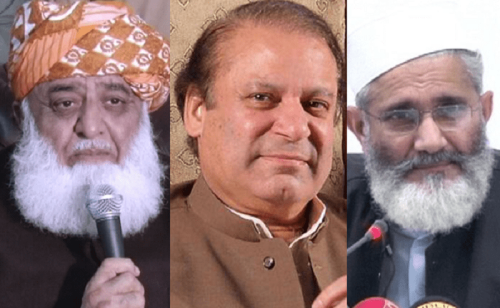FORMER prime minister Nawaz Sharif’s acquittal in two major corruption cases — Avenfield Apartments and Al-Azizia Steel Mills — over the past month has reignited discussions about his potential comeback in politics. While the development has cleared his path to run in the upcoming elections and reclaim his role as PML-N’s president, it may not be a walk in Hyde Park for Mr Sharif.
However, until things get settled for him, Mr Sharif can revel in the fact that even at this point his political future seems more secure than that of his long-time nemesis, Imran Khan. Mr Khan, serving a three-year sentence for corruption in Adiala Jail, remains disqualified from contesting elections after the Islamabad High Court (IHC) rejected his plea on Thursday to suspend the conviction.
The legal community remains split over Mr Sharif’s prospects. The debate hinges on whether the legislative amendment to the Elections Act can retrospectively apply to Mr Sharif’s case and whether it supersedes the constitutional provision under which the former premier was disqualified.
Although parliament has limited disqualifications to a maximum of five years, some legal experts believe that Mr Sharif might not gain an advantage from this amendment to the Elections Act. This scepticism stems from the fact that the Supreme Court’s interpretation of disqualification relates to a specific article in the Constitution, and it is widely held that an Act of parliament, such as this amendment, cannot supersede a constitutional provision.
While Nawaz basks in glory of his recent acquittals in Avenfield and Al-Azizia cases, not all legal experts agree on smooth sailing ahead of polls
Mr Sharif’s troubles began after the Panama Papers leak in April 2016, which subsequently led to his disqualification in July 2017 from holding public office. The court’s decision was based on Article 62(1f) of the Constitution, which requires parliamentarians to be sadiq and ameen (honest and righteous).
The SC then directed NAB to initiate three corruption references against him: the Avenfield, Flagship and Al-Azizia cases.
In July 2018, Mr Sharif was sentenced to 10 years in the Avenfield case and in December of that year, he was sentenced to a further seven years in the Al-Azizia case. He was found not guilty in the Flagship reference.
Following the two convictions, Mr Sharif was disqualified from politics, as the law bans those convicted from holding or running for public office.
Mr Sharif later filed appeals in the IHC. These appeals revived in October this year when the former prime minister returned to Pakistan, ending his four-year self-exile, ahead of the Feb 8 elections.
The IHC has now overturned both the conviction and the disqualification that had been imposed on him by the accountability courts under the National Accountability Ordinance (NAO).
Arguments for and against eligibility
Barrister Zafarullah Khan, a former special assistant on law during the PML-N regime, argues that Mr Sharif can contest elections, citing an amendment to the Elections Act by the previous Pakistan Democratic Movement-led government. That amendment to Section 232 of the Elections Act caps disqualifications at five years.
Barrister Khan believes that Mr Sharif can now submit his nomination papers to the returning officer for the elections and if someone objected to his candidacy, the matter would be resolved through judicial review.
However, senior lawyer Raja Inam Ameen Minhas counters this view, emphasising that the amended law cannot benefit Mr Sharif since the legislature did not amend Section 232 retrospectively. He says that since the amendment entails penal consequences, it cannot deal with the matter in the past. According to him, the law that deals with punishment cannot be applied retrospectively unless the legislature categorically gives this effect.
Mr Minhas explains that the NAO was promulgated in 1999, but the legislature gave it a retrospective effect.
Complicating matters is the Supreme Court’s 2018 ruling that disqualifications under Article 62(1f) of the Constitution are lifelong. This ruling directly impacts Mr Sharif, who was disqualified under this provision.
Mr Minhas believes the SC may settle the debate once and for all.
As it goes, the SC is set to examine the matter. It has issued a public notice inviting concise statements of potential candidates who may relate to the disqualification case for a hearing on Jan 2.
Advocate Kashif Ali Malik supports the “lifelong” interpretation, asserting that statutory amendments — like the one to the Elections Act — cannot interpret, override or defeat constitutional provisions.
Mr Malik, however, also hopes that the outcome of the Supreme Court’s hearing will provide definitive clarity on whether Nawaz Sharif can indeed make a political comeback.
Published in Dawn, December 24th, 2023














































Dear visitor, the comments section is undergoing an overhaul and will return soon.